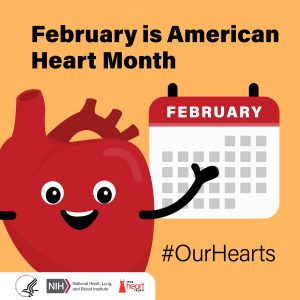Tuesday, February 13, 2024
 February is American Heart Month, and it is a perfect opportunity to recognize the importance of heart health, especially for older adults. As we age, our risk of developing heart disease and stroke increases, making it more important to take care of our hearts.
February is American Heart Month, and it is a perfect opportunity to recognize the importance of heart health, especially for older adults. As we age, our risk of developing heart disease and stroke increases, making it more important to take care of our hearts.
This month is an opportunity for older adults to engage in heart-healthy activities and lifestyle changes that enhance overall well-being. By participating in awareness campaigns, educational events, and community initiatives associated with American Heart Month, older adults can connect with resources, support networks, and healthcare professionals who can guide them toward making positive changes in their lives.
Did you know that people who have close relationships at home, work, or in their community tend to be healthier and live longer? One reason, according to the National Heart, Lung, and Blood Institute (NHLBI), is that we’re more successful at meeting our health goals when we work on them with others. NHLBI launched the #OurHearts movement to inspire us to protect and strengthen our hearts with the support of others.
Heart disease and stroke are largely preventable, especially when you have others to help! There are many lifestyle changes that older adults can make to reduce their risk, including:
- Eating a healthy diet: Consume plenty of fruits, vegetables, whole grains, and lean proteins. Limit salt, saturated and trans fats, and added sugars.
- Exercising regularly: Physical activity can help lower blood pressure, maintain a healthy weight, and reduce the risk of heart disease and stroke. Aim for at least 30 minutes of moderate-intensity exercise on most days of the week.
- Quitting smoking: Smoking is a major risk factor for heart disease and stroke. Quit now, no matter how old you are, to significantly reduce your risk of these conditions.
- Managing stress: Chronic stress is linked to heart disease and stroke, so find healthy ways to manage stress, such as through mindfulness, meditation, or physical activity.
- Monitoring blood pressure and cholesterol levels: Regular monitoring of these two key indicators can help you and your doctor identify potential heart health problems early.
Looking for more ways to get moving and join the #OurHearts movement? AgeGuide’s funded partners offer health promotion and education classes. To find a program in your area click HERE.

 February is American Heart Month, and it is a perfect opportunity to recognize the importance of heart health, especially for older adults. As we age, our risk of developing heart disease and stroke increases, making it more important to take care of our hearts.
February is American Heart Month, and it is a perfect opportunity to recognize the importance of heart health, especially for older adults. As we age, our risk of developing heart disease and stroke increases, making it more important to take care of our hearts.